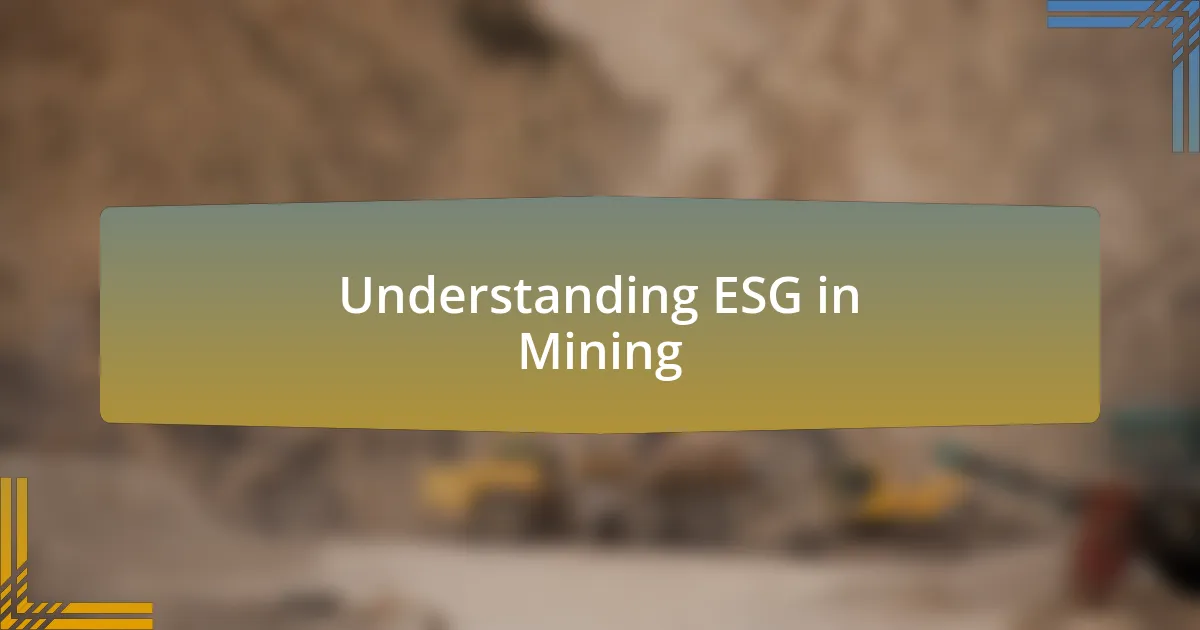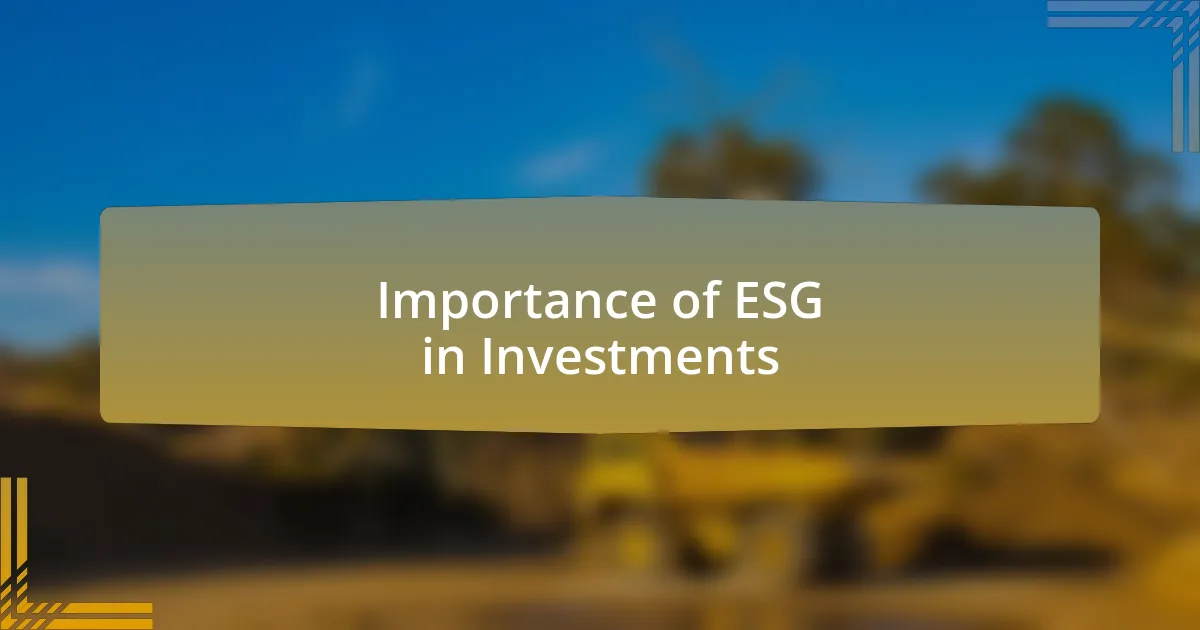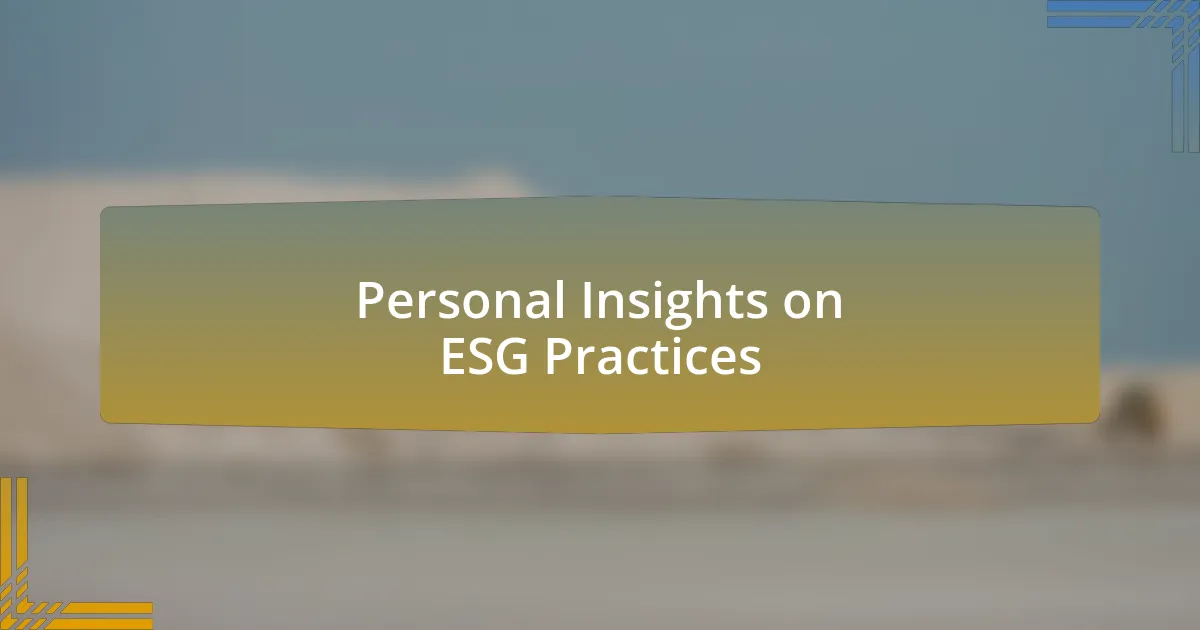Key takeaways:
- Understanding ESG principles is vital for fostering sustainability, stakeholder trust, and long-term profitability in mining.
- Investing with an ESG focus promotes responsible practices, reduces regulatory risks, and can lead to community enhancements.
- Practical ESG training equips investors with tools for due diligence, sustainability reporting, and stakeholder engagement, enhancing investment strategies.
- Personal experiences underline the transformative impact of ESG practices, shaping a mindset that values ethical considerations alongside financial returns.

Understanding ESG in Mining
Understanding ESG in mining is more crucial than ever. I recall my first experience at a mining investment conference, where discussions about environmental, social, and governance (ESG) factors opened my eyes to their significance. Why should investors care about ESG? Because it directly impacts sustainability and stakeholder trust, which ultimately affects a company’s profitability and longevity.
As I delved deeper into ESG principles, I realized that they are not just buzzwords; they are essential frameworks guiding responsible mining practices. For instance, I remember reading about a mining company that implemented rigorous environmental assessments before launching a project. This proactive approach not only minimized their ecological footprint but also fostered better relationships with local communities. Can you imagine the long-term benefits they reaped as a result?
Taking the time to understand ESG in mining goes beyond compliance—it reflects a commitment to ethical practices. Personally, it reminds me of a conversation I had with a geologist who emphasized the importance of transparency in operations. He believed that when companies operate honestly and engage with their communities, they pave the way for a more responsible and prosperous mining industry. It’s a lesson I’ve carried with me; fostering trust is invaluable, isn’t it?

Importance of ESG in Investments
Investing with an ESG lens means prioritizing long-term value over short-term gains. I vividly recall meeting a senior investor who had shifted his portfolio to focus on companies with strong ESG practices. His passion for sustainable investments was evident. He argued that companies committed to ESG not only perform better financially but also secure their future in increasingly environmentally-conscious markets. Doesn’t that make you think about where you’re placing your investments?
The importance of ESG in investments cannot be overstated, particularly in the mining sector, where environmental and social impacts are at the forefront. I once attended a workshop where experts discussed the tangible benefits of ESG strategies. A participant shared how their investment in an ESG-compliant mining operation resulted in reduced regulatory risks and enhanced community support. It struck me that investing responsibly can transform entire communities, creating a win-win scenario—a fact that often gets overlooked.
Moreover, integrating ESG factors into investment decisions demonstrates a forward-thinking approach that resonates with today’s investors. I often think back to a lively debate with my peers about the moral obligation of investors in promoting sustainable practices. During that discussion, it became clear that investors can influence positive change, ultimately shaping an industry that thrives not only on profits but also on the well-being of people and the planet. Isn’t that a compelling reason to consider ESG in your investment strategy?

Practical Applications of ESG Training
Understanding the practical applications of ESG training can lead to significant enhancements in our investment strategies. For instance, during a recent training session, I learned how to conduct thorough due diligence that includes assessing a company’s ESG performance. This skill has allowed me to identify red flags in potential investments, ensuring that I not only seek financial returns but also prioritize ethical considerations that could impact the long-term viability of those investments.
I remember a case study that highlighted how a mining company implemented a community engagement program after ESG training, transforming its relationship with local populations. Witnessing the direct correlation between investor awareness and community well-being made me appreciate the profound impact of responsible investing. This experience reinforced my belief that our investment decisions can drive positive social change, shifting my approach to prioritize companies that actively contribute to their communities.
Moreover, I’ve found that the practical tools I gained from ESG training—such as sustainability reporting and stakeholder engagement strategies—are invaluable in today’s marketplace. These tools not only bolster my confidence as an investor but also help me communicate effectively with industry peers about the importance of integrating ESG in our discussions. Have you ever considered how your investment choices can foster accountability and transparency? I know I have, and it opens up an exciting dialogue about our collective responsibility in shaping a sustainable future.

Personal Insights on ESG Practices
Reflecting on my experiences with ESG practices, I’ve come to realize just how transformative they can be for an investor’s mindset. I once attended a workshop where the speaker shared a powerful story about a mining project that, rather than just exploiting resources, actively invested in the local ecosystem and community health. This moment opened my eyes to the fact that profits shouldn’t come at the expense of the environment or the people living nearby. It reshaped my understanding of what responsible mining should look like.
Incorporating ESG principles has also made me more selective about the companies I consider for investment. I can’t help but think back to a time when I hesitated to support a project that didn’t seem to prioritize environmental care. That decision turned out to be a pivotal moment; the company later faced backlash and financial difficulties because of its disregard for sustainability. This experience underscored for me the importance of trusting my instincts when ESG factors are at play.
As I delve deeper into ESG practices, I often find myself questioning—how do we measure the true impact of our investments? It’s not just about balancing the books; it’s about ensuring that each dollar contributes to something greater. I’ve learned that this awareness not only enriches my investment portfolio but also aligns my choices with my values, creating a profound sense of purpose in my financial journey.